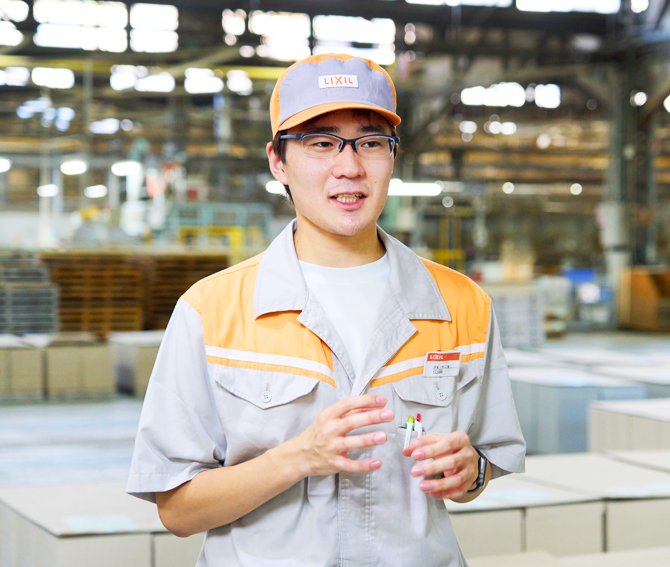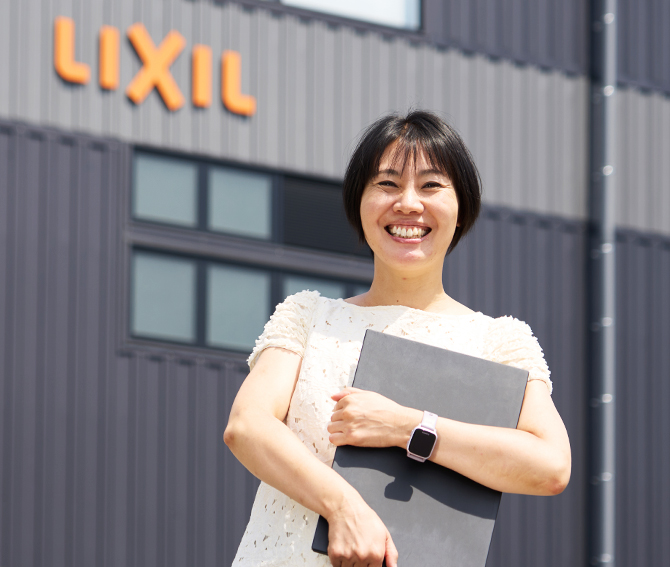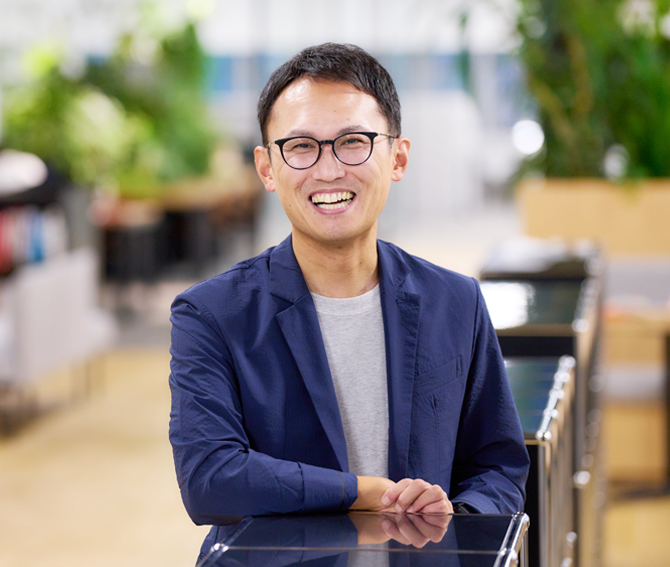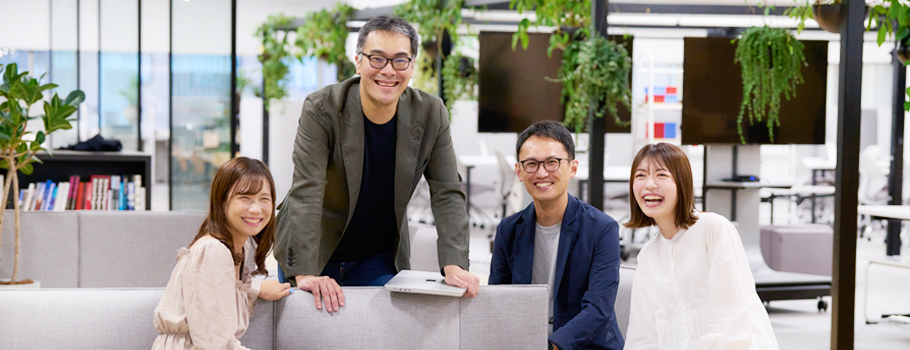LIXIL makes pioneering water and housing products that solve everyday, real-life challenges, making better homes a reality for everyone, everywhere.
- Global Site
-
- English
- Japanese
- Brand Sites
Global
- Global Site
-
- English
- Japanese
- Brand Sites

Yosuke Yamada, Tile Division
It’s a tricky job predicting when the inks used to decorate tiles need replenishing – and manually checking stock levels of those inks is time-consuming. Yosuke Yamada, an employee in the Tile Division at LIXIL’s Iga-Ueno plant, could see a better way of working.
He realized that by linking tile production schedules with ink levels, it would be possible to manage stock far more efficiently. And so, using a “no-code” infrastructure, he built an app to do just that. A second app he’s working on will mean ink-tank levels can be managed without the need for visual checks.
Yamada’s app is just one of over 850 developed by LIXIL employees and implemented over the past year. This type of digital empowerment of non-experts, known as citizen app development, is creating practical solutions to everyday issues around the business as it undergoes a digital and cultural transformation.
App Creation for Everybody
Like most of LIXIL’s citizen app developers, Yamada has no formal coding experience or in-depth IT expertise. Instead, he was able to take advantage of a program of digital democratization that LIXIL started rolling out in 2021.
The program empowers employees to tackle the challenges they see within the workplace, solving issues quickly without an overly burdensome process. It provides employees outside of the digital divisions with the tools and support needed for no-code app development, meaning they do not need to know programming languages.
Initiatives to promote homegrown apps are recognized globally as an important way to drive forward digital transformation¹.Research from McKinsey, meanwhile, shows that companies that empower general employees to develop applications – freeing up professional developers to focus on more challenging tasks – score higher on innovation².According to a survey by DreamArts, however, only 19.3% of companies in Japan with digital transformation programs have implemented relevant tools³.
For LIXIL, empowering all employees – not just those in the digital division – to use digital tools to create new value is a key way of ensuring continued sustainable growth. “Experiment and learn” is a central part of LIXIL’s culture – and is crucial to its ability to be agile and entrepreneurial.

“I’m glad we’re in an environment where even a young employee like me has the freedom to develop apps,” says Yamada.
Working on his app, he says, has also provided him with new learning opportunities. “During app development, I had the chance to report directly to the senior manager. Before, they’d felt quite far away from what I do, but they were encouraging and gave me advice. Having this kind of openness in the company helps me with my work.”
More Agile, More Efficient

Hitomi Kanetake, Kitchen and Vanity Division
Hitomi Kanetake, Group Leader of Kitchen Development in LIXIL’s Kitchen and Vanity Division, also tried her hand as a developer. She created an app to improve the process of requesting new products for her customers.
Compared to the previous system of development, which relied on the involvement of the digital team, day-to-day problems are solved far more quickly. Handing greater autonomy to employees to develop their own apps has also boosted morale and motivation.
“I got a real feel for how LIXIL wants us to be agile in nurturing an entrepreneurial spirit and taking on challenges without fearing failure,” Kanetake says.
“Before, when we needed to improve our business systems, we would issue a request to the digital division, sometimes having to wait as long as several months,” she explains. “But by creating our own apps, we can quickly make improvements as needed while reflecting the voices of those on the ground in real time.”
In the year since LIXIL launched its project to promote citizen developers, employees have proposed more than 20,000 business apps, many of which tap into on-the-ground knowledge. Before the apps reach the production phase, they are reviewed by a Center of Excellence team that checks there is no duplication with other apps in process and ensures there are no governance or security risks.
Creating a Culture of Problem-Solving

Saki Nomaguchi, General Affairs Department
“Once I got the no-code development tool, I noticed how many everyday work tasks I could solve with an app,” says Saki Nomaguchi, who works in the General Affairs Department.
Nomaguchi helped create an app that checks people’ s alcohol levels before they drive. A recent update to Japanese law has made alcohol checks mandatory before driving for business purposes.
The app has become widely used throughout the business – but improvements to work processes are not the only benefit for Nomaguchi.
“When people use the apps I’ve developed and are happy with them, it motivates me,” she says. “I also really enjoy interacting with other people in the company during the development process.”
It is this interaction around the business that is one of the reasons the digital democratization project has got such traction at LIXIL. CEO Kinya Seto and other management have made a concerted effort to create a flat and open corporate culture that is employee-centric, rather than a more top-down, traditional management structure. This includes encouraging interaction between junior employees and management, and ensuring that everyone feels empowered to tackle any challenges their jobs present.
Making Digital Democratization a Reality
One of the first steps LIXIL took to get citizen development to stick was to train all its executives in Google AppSheet, a no-code app development tool. Executives each created their own apps that were shared with all employees.

Aoi Miura, Shared Platform Department in LIXIL’s Digital Function
“Once all the senior executives had a go, the feeling that staff could too – and keep doing so – quickly spread, leading to a change in the whole company’s culture,” explains Aoi Miura, Leader of the Shared Platform Department in LIXIL’s Digital Function.
This entrepreneurial spirit and agile mindset, where employees solve problems independently, “has permeated quickly over the past year,” he adds.
And the Digital Division – the previous home of all these digital transformation initiatives – shares his view.
“The results of this initiative have exceeded our expectations,” says Osamu Iwasaki, Senior Vice President and Leader of the Systems Development and Operations Division in the Digital Function.
It has also had the effect of creating a new sense of company unity, he says. As LIXIL was created through the merger of several companies, a number of silos existed previously. But the common language of no-code has led to spontaneous information-sharing around the business, uniting people however they came to LIXIL.

CoE team promoting no-code development (from left: Yuka Inaki, Osamu Iwasaki, Aoi Miura, Minami Iwasaki)
And when people from other companies ask Iwasaki about digital democratization, he is happy to share LIXIL’ s methodology.
“I’d be happy for this to become an example of how to energize Japanese companies.”
Our Stories
- Backing People and Passions to Drive Innovation
- How Toilets in Schools are Catalyzing Change in Communities
- Building the Future by Recycling the Past
- Reinventing Consumer Connections in the World's Largest E-commerce Market
- Tackling Household Water Inefficiency in a Water-Stressed World
- Plugging the Plumber Shortage
- Pioneering Solutions to a Sewage Crisis in Rural Alabama
- Meet the Citizen Developers Changing How We Work
- Design and Brand Identity Transformation at LIXIL
- Three Changes to Prepare Europe’s Sanitary Industry for Growth
- Three Steps to Creating an Inclusive Culture
- From Linear to Circular: Giving Products in Your Home a New Lease of Life
- Crafting Unique Experiences as well as Products
- GROHE X: A Digital Brand Experience
- Design-led Innovation Delivering True Value
- Responsible Use of Plastics
- Empowering our People for an Agile Future
- Turning the Waves of Change into Opportunities
- SATO Tap: a New Handwashing Solution for All
- New Ways of Working Take Flight at LIXIL
- INAX: Rituals of Water
- Refreshing our sanitation targets, standing firm on our commitments
- Developing Attractive and Differentiated Products
- Conserving Water: The New Normal
- Insulating For a Warmer and Healthier Home
- Open Kitchen, Open Communication
- Tackling Open Defecation in India
- Shaping the Future of Faucets, One 3D Layer at a Time
- Bathed in Culture and Tradition
- Remodeling the Housing Market
- LIXIL's AQUA CERAMIC makes bathroom stains a thing of the past
- The Technology of Water
- Tackling Challenges in Global Sanitation and Hygiene
